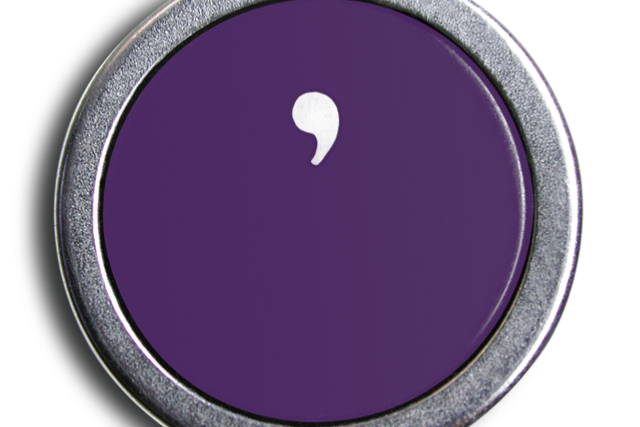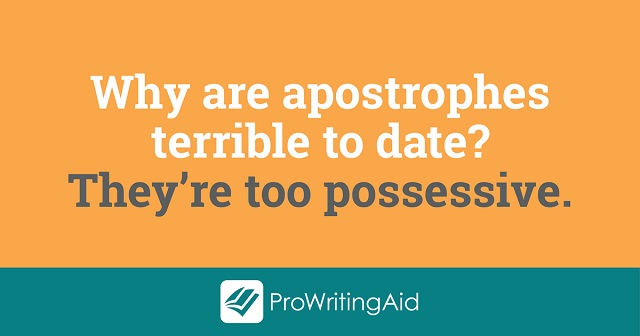
Have you noticed a flare of apostrophes lately in online content? Let’s clear up the confusion once and for all.
The only times you use apostrophes are to show possession or to show omissions formed by contractions.
That’s it. Ah, but if it were only that simple, everyone would use apostrophes correctly. Let’s look at some specific apostrophe examples.
1. Showing possession
When any noun, whether it’s a person, place, or thing, possesses something, you always add an apostrophe plus "s." If, however, the noun is already plural with an "s" on the end, simply add an apostrophe. Otherwise, if the noun is plural but doesn’t end with an "s," add an apostrophe plus "s."
- The Grants’ house is a beautiful Tudor style much admired by all the neighbors.
- The children’s bedrooms were all on the second floor.
- He believed Amy’s assertion it was all a misunderstanding.
- When the mare’s colt was finally weaned, it was time for him to begin training.
- The fire engines’ piercing sirens were heard long before they came into view.
When NOT to use apostrophes to show possession
When you use possessive pronouns as adjectives like "his," "hers," "ours," etc., don’t include an apostrophe. For example:
- The car was hers, his, ours, theirs…
2. Showing omissions in contractions
When you create a contraction, you remove letters and insert an apostrophe in their place. For example:
- He couldn’t believe it was time to leave already.
- Jane hasn’t been to the club before.
- Don’t forget to lock the door behind you.
- You know she’ll believe anything he tells her.
Where apostrophes don’t belong
Its vs. It’s
If you’re using "it’s" as a contraction meaning "it is," an apostrophe is correct. However, if you’re trying to show possession of the adjective "it," there’s no apostrophe. Here are a few examples:
- The fire engine blasted its siren to warn people to clear the area.
- The house had no furniture in its second-floor bedrooms.
- The cat showed its disdain by ignoring her completely.
- When the ice cream truck arrived, its alluring tune called to all children.
Whose vs. Who’s
Again, if you’re using "who’s" as a contraction for "who is," it’s appropriate to use an apostrophe. But when you’re wondering to whom an object belongs, use "whose." Let’s clarify with a few examples.
- Whose tennis shoes are in the way?
- I can’t decide whose story I like better.
- She wondered whose bedroom light was still on at the neighbors.
- He didn’t have time to figure out whose dog was digging up his flowerbeds.
Compare those sentences to the following:
- Who’s going to the game tonight?
- Mary wanted to know who’s playing the piano tonight.
- Jack thought he knew who’s causing the most problems.
- It wasn’t clear who’s calling the shots.
Your vs. You’re
Another pronoun to confuse you, only use "you’re" as a contraction short for "you are." And only use "your" to show possession.
- You’re going to be late.
- I don’t believe you’re really serious.
- You’re not what I expected at all.
- Forget it if you’re only interested in being friends.
Compared to:
- Your brother is going to be late.
- I don’t believe your car will seriously start.
- I expect your manuscript to be free of errors.
- Forget it if your interest is only in friendship.
Don’t use an apostrophe to make a regular noun plural
Finally, sometimes those apostrophes creep in where they shouldn’t:
- Apostrophe’s are confusing should read Apostrophes are confusing.
- Our family has celebrated many merry Christmas’s should read Our family has celebrated many merry Christmases.
- There are two bus’s that run that route should read There are two buses that run that route.
- The Germans favored blitz’s during WWII should read The Germans favored blitzes during WWII.
Final thoughts
Now apostrophes are clear, right? Call it out when you see inappropriate apostrophe use online. Let the digital world be tranquil and replete with properly used apostrophes from here on out.
Let us know in the comments below misuse of apostrophes that drives you nuts.


